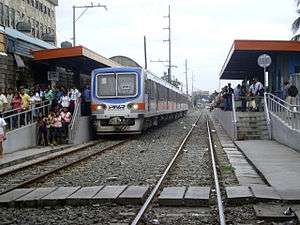Blumentritt railway station
Blumentritt | |||||||||||||||||||||||||||||||||||||||
|---|---|---|---|---|---|---|---|---|---|---|---|---|---|---|---|---|---|---|---|---|---|---|---|---|---|---|---|---|---|---|---|---|---|---|---|---|---|---|---|
| Philippine National Railways | |||||||||||||||||||||||||||||||||||||||
 Platform area of Blumentritt station | |||||||||||||||||||||||||||||||||||||||
| Location |
Old Antipolo Street, Rizal Avenue and Leonor Rivera Street Sta. Cruz, Manila | ||||||||||||||||||||||||||||||||||||||
| Coordinates | 14°37′21.33″N 120°59′5.22″E / 14.6225917°N 120.9847833°ECoordinates: 14°37′21.33″N 120°59′5.22″E / 14.6225917°N 120.9847833°E | ||||||||||||||||||||||||||||||||||||||
| Owned by |
Department of Transportation and Communications Philippine National Railways | ||||||||||||||||||||||||||||||||||||||
| Line(s) |
█ PNR Southrail, Antipolo line, Cavite line (defunct)
| ||||||||||||||||||||||||||||||||||||||
| Platforms | Side platforms | ||||||||||||||||||||||||||||||||||||||
| Tracks | 2 | ||||||||||||||||||||||||||||||||||||||
| Connections | Transfer to LRT Line 1 via Blumentritt sidewalk to Blumentritt station. | ||||||||||||||||||||||||||||||||||||||
| Construction | |||||||||||||||||||||||||||||||||||||||
| Disabled access | Yes | ||||||||||||||||||||||||||||||||||||||
| Other information | |||||||||||||||||||||||||||||||||||||||
| Station code | BLU | ||||||||||||||||||||||||||||||||||||||
| History | |||||||||||||||||||||||||||||||||||||||
| Opened | December 22, 1905 | ||||||||||||||||||||||||||||||||||||||
| Rebuilt | 1934, 1978, 1990, 2009 | ||||||||||||||||||||||||||||||||||||||
| Services | |||||||||||||||||||||||||||||||||||||||
| |||||||||||||||||||||||||||||||||||||||
PNR Metro Commuter |
|---|
North-South Commuter Line |
Blumentritt station is a station on the South Main Line ("Southrail") of the Philippine National Railways. Like all PNR stations, it is at grade. It is located at the corner of Old Antipolo Street and Rizal Avenue in Santa Cruz, Manila and derives its name from nearby Blumentritt Road, which is named after the Bohemian professor Ferdinand Blumentritt, friend of José Rizal and sympathizer of the Filipino cause.
The station is the second station southbound from Tutuban and is the first of four Southrail stations serving Sampaloc.
Blumentritt station is one of four stations whose original platforms have been retained for service. However, it is unique in the sense that the new platforms designed to accommodate new PNR diesel multiple units are not connected to the station's original platforms, unlike solutions employed at stations such as España, where the new platforms are directly connected to the original ones. The old platforms are still used to accommodate Commuter Express locomotives and especially intercity trains.
Nearby landmarks
The station is near major landmarks such as the Blumentritt Market, SM City San Lazaro (previously the San Lazaro Hippodrome), the Chinese General Hospital and Medical Center, the Manila Chinese Cemetery, Manila North Cemetery[1] and adjacent to an old school Manuel L. Quezon High School.[2] Further away from the station are the Manila North Cemetery, La Loma Cemetery, Lourdes School of Quezon City, and St. Theresa's College of Quezon City.
Transportation links
Blumentritt station is accessible by jeepneys plying the Rizal Avenue route. Cycle rickshaws are also used to navigate around the station's immediate vicinity.
A Manila Light Rail Transit System station, also named Blumentritt, is located immediately above the station.
Station Layout
| L1 Platforms |
Side platform, doors will open on the right | |
| Platform A | PNR Metro Commuter towards Tutuban (←) | |
| Platform B | PNR Metro Commuter towards Calamba (→) | |
| Side platform, doors will open on the right | ||
| L1 | Concourse/ Street Level |
Ticket Booths, Station Control, Shops, LRT-1 Blumentritt station, San Roque De Manila Parish |
History
Blumentritt (then San Lazaro) was opened in December 22, 1905, as a station originally part of the Antipolo and Montalban lines, the Blumentritt-Santa Mesa segment of the current PNR Southrail was part of the defunct line but now it is being used for the PNR Metro South Commuter services.
References
- ↑ "Manila North Cemetery". Google+.
- ↑ "Manuel L. Quezon High School". NearbyPH.